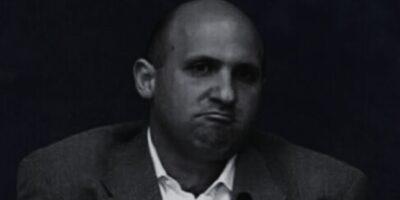The Haitian police force is understaffed in the fight against gangs, yet hundreds of officers are assigned to protect influential individuals
When “Prophet” Markinson Dorilas arrived at the Karibe Hotel on the morning of April 5, 2025, to take part in a broadcast, he was accompanied by a soldier in uniform from the Haitian army carrying a military-grade weapon.
Questioned on-site by AyiboPost, Dorilas revealed that his extensive security team included four police officers, one army soldier, and a personal bodyguard.
This case represents just the tip of the iceberg: hundreds of police officers and soldiers are — officially or unofficially — assigned to protect businesspeople, government affiliates, former state officials, or even private companies.

Photo of the soldier accompanying the so-called “prophet” Markinson Dorilas. Photo: AyiboPost
This practice forces the Haitian state to cover the monthly security costs of influential individuals, even as the National Police (PNH) and the army lack sufficient personnel to protect the general public from gang violence.
“The indiscipline and chaos that characterize the police force’s management prevent authorities from putting an end to this practice, which weakens the PNH and limits the deployment of available officers to fight insecurity,” says attorney Samuel Madistin, chairman of the board at Fondasyon Je Klere, to AyiboPost.
In a country like the United States, cabinet members receive state-funded protection for six months after leaving office. This protection can be extended if credible threats exist. However, former officials are not entitled to lifelong taxpayer-funded security.
Hundreds of police officers and soldiers are — officially or unofficially — assigned to protect businesspeople, government affiliates, former state officials, or even private companies.
In Haiti, the law gives the National Police the duty to protect state institutions — a mission that includes safeguarding current officials. “No legal provision explicitly grants such protection to former officeholders,” says Madistin.
In practice, however, former ministers, ex-civil servants, and even political figures with no official roles appear to benefit from permanent police escorts funded by public money.
For instance, on April 21, AyiboPost observed two armed officers — carrying assault rifles and wearing police caps — stationed at the private clinic of former Prime Minister Jack Guy Lafontant on Ruelle Berne, more than six years after he left office.

An officer armed with an assault rifle and wearing a PNH cap at the private clinic of former Prime Minister Jack Guy Lafontant. Photo: AyiboPost
Lafontant, a gastroenterologist, did not respond to an email request for comment sent two days after the visit.
In Haiti, security privileges are not limited to former top officials. They are often extended to politically influential figures. According to one source, at least one officer regularly accompanied political operator Me André Michel, a close ally of former Prime Minister Ariel Henry.
This trend is occurring in a context where over half the National Police’s personnel are concentrated in the Ouest Department.
Yet “most of these officers are assigned to protect individuals or are engaged in private activities, which prevents them from actively participating in the fight against insecurity,” says Garry Jean Baptiste, union leader with SPNH-17, to AyiboPost.
“No unit escapes this disorder,” adds the officer with 21 years of experience, noting that “more than 20 elite SWAT officers are on detached duty, along with 10 to 15 members of the Departmental Operations and Intervention Brigade (BOID).”
Lionel Lazarre, spokesperson for the Haitian National Police, did not respond to AyiboPost’s request for comment.
Officers assigned to private duties carry out a wide range of tasks, sometimes on the edge of legality.
Some provide security for buildings or private companies. According to three sources familiar with the matter, the money received from these entities is often shared with the officers’ superiors.
Others monitor land involved in property disputes or are assigned to influential individuals living abroad. In the absence of those they are supposed to protect, the officers remain inactive yet continue to receive their state salary.
“The politicization of the police also manifests in this way,” says Garry Jean Baptiste, adding that this disorganization undermines the force’s ability to rely on its key personnel.
To receive a daily summary of these news stories on WhatsApp, click here.
Haiti’s security forces suffer from a severe staffing shortage. The army and the police have approximately 1,000 soldiers and 12,000 officers, respectively.
These figures are likely inflated due to emigration and assassinations and fall far short of international standards for a population of around 12 million.
The shortage is so severe that in early April, the government announced plans to deploy an irregular armed brigade — already implicated in multiple human rights violations — to help tackle insecurity.
The semi-privatization of the PNH further reduces the number of officers available for public service.
Low pay and salary delays are accelerating this trend.
A soldier in his 30s, who has been assigned for three months to protect a member of the transitional Presidential Council, denounces deplorable working conditions: unpredictable bonuses, unpaid allowances, and arbitrary deductions imposed by his superiors.
He reports receiving a monthly salary of less than 30,000 gourdes, often paid late, along with a prepaid card worth 15,000 gourdes and sporadic fuel vouchers worth several thousand gourdes.
Such conditions push many police officers and soldiers to seek informal detached positions.
Lire plus : Police officers desert the streets of Port-au-Prince
According to statements made by “Prophet” Markinson Dorilas in the courtyard of the Karibe Hotel, the officers accompanying him “work for him privately,” without going through official channels.
This behavior, according to Me Madistin, “violates the ethical rules of the police institution.”
When an officer serves private interests for payment while using state-issued resources, “that constitutes an act of corruption,” Madistin adds, calling on the PNH to implement clear regulations to put a stop to this practice.
By : Widlore Mérancourt & Jérôme Wendy Norestyl
Cover | Photo of a military personnel. Photo : Freepik
► AyiboPost is dedicated to providing accurate information. If you notice any mistake or error, please inform us at the following address : hey@ayibopost.com
Keep in touch with AyiboPost via:
► Our channel Telegram : Click here
►Notre Channel WhatsApp : Click here
►Our Community WhatsApp : Click here







Comments